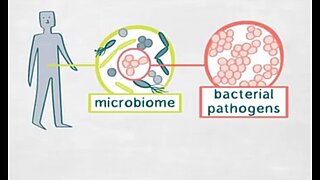Prof. Dr. Andreas Peschel
Spokesperson
Contact

University of Tübingen
Interfaculty Institute of Microbiology and Infection Medicine
Department of Infection Biology
Auf der Morgenstelle 28
72074 Tübingen, Germany
andreas.peschel@uni-tuebingen.de
Tel.: +49 7071 29-75935
Research Interest
Andreas Peschel's research interests focus on the interactions of bacteria in microbiomes, particularly in those of the nose and skin. He also investigates the interactions of members of these microbiomes with the host. Based on a better understanding of these microbial communities, new therapeutic approaches are to be developed and infections better combated in the future.
Andreas Peschel's research group is primarily investigating the bacterium Staphylococcus aureus and its interaction with the host both during asymptomatic colonisation of the nose and during an infection. His research focuses on teichoic acids, the cell wall components of gram-positive bacteria, and the mechanisms by which S. aureus can evade the host's defenses. In his studies, he came across two antibiotic substances - Epifadin and Lugdunin, both of which are produced by staphylococci. Lugdunin is produced by the bacterium S. lugdunensis, which is found in the nose. The antibiotic substance Epifadin is produced by the bacterium S. epidermidis. Both substances are effective against multi-resistant variants of S. aureus (MRSA).
About Andreas Peschel
Andreas Peschel studied biology at the universities of Bochum and Tübingen. He gained his doctorate in microbiology in Tübingen in 1995. He was then a postdoctoral researcher with Friedrich Götz in Tübingen. This was followed by a further postdoctoral phase at the University of Utrecht, NL. After returning to Tübingen, he initially became a junior research group leader in Tübingen until he was appointed Professor of Cellular and Molecular Microbiology at the Institute of Medical Microbiology and Hygiene in 2003. In 2008, he accepted the professorship for Microbiology at the Interfaculty Institute of Microbiology and Infection Medicine Tübingen (IMIT), where he has since headed the Chair of Infection Biology. Andreas Peschel is the spokesperson for the Cluster of Excellence CMFI.
Awards & Honors
Andreas Peschel's work has been awarded numerous awards and honors. These include the Prize of the German Society for Hygiene and Microbiology in 2010 and the Emil von Behring Prize in 2022. Andreas Peschel has been a member of the German National Academy of Sciences Leopoldina since 2022.
Selected Publications
- Maier L, Stein-Thoeringer C, Ley R, Brötz-Oesterhelt H, Link H, Ziemert N, Wagner S, Peschel A (2024) Integrating research on bacterial pathogens and commensals to fight infections - an ecological perspective. Lancet Microbe S2666-5247(24)00049-1. doi: 10.1016/S2666-5247(24)00049-1.
- Torres Salazar BO, Dema T, Schilling NA, Janek D, Bornikoel J, Berscheid A, Elsherbini AM, Krauss S, Jaag SJ, Lämmerhofer M, Min Li, Alqahtani N, Horsburgh MJ, Weber T, Beltrán-Beleña JM, Brötz-Oesterhelt H, Grond S, Krismer B, Peschel A (2024) A nasal commensal produces the broad spectrum and short-lived antimicrobial peptide polyene epifadin to eliminate Staphylococcus aureus. Nat Microbiol. 9:200-213. doi: 10.1038/s41564-023-01544-2.
- Heilbronner S, Krismer B, Brötz-Oesterhelt H, Peschel A (2021) The microbiome-shaping roles of bacteriocins. Nat Rev Microbiol. 19:726-739. doi: 10.1038/s41579-021-00569-w.
- Du X, Larsen J, Li M, Walter A, Slavetinsky C, Both A, Sanchez Carballo PM, Stegger M, Lehmann E, Liu Y, Liu J, Slavetinsky J, Duda KA, Krismer B, Heilbronner S, Weidenmaier C, Mayer C, Rohde H, Winstel V, Peschel A (2021) Staphylococcus epidermidis clones express Staphylococcus aureus-type wall teichoic acid to shift from a commensal to pathogen lifestyle. Nat Microbiol. 6:757-768. doi: 10.1038/s41564-021-00913-z.
- Gerlach D, Guo Y, De Castro C, Kim SH, Schlatterer K, Xu FF, Pereira C, Seeberger PH, Ali S, Codee J, Sirisan W, Schulte B, Wolz C, Larsen J, Molinaro A, Lee BL, Xia G, Stehle T, Peschel A (2018) Methicillin-resistant Staphylococcus aureus alters cell wall glycosylation to evade immunity. Nature 563:705-709. doi: 10.1038/s41586-018-0730-x.
- Taconnelli E, Autenrieth IB, Peschel A (2017) Fighting the enemy within. Science 355:689-690. doi: 10.1126/science.aam6372.
- Zipperer A, Konnerth MC, Laux C, Berscheid A, Janek D, Weidenmaier C, Burian M, Schilling NA, Slavetinsky C, Marschall M, Willmann M, Kalbacher H, Schittek B, Brötz-Oesterhelt H, Grond S, Peschel A*, Krismer B (2016) Human commensals producing a novel antibiotic impair pathogen colonization. Nature 535:511-6. (*, corresponding author). doi: 10.1038/nature18634.
- Hanzelmann D, Joo HS, Franz-Wachtel M, Hertlein T, Stevanovic S, Macek B, Götz F, Otto M, Kretschmer D, Peschel A (2016) Toll-like receptor 2 activation depends on lipopeptide shedding by bacterial surfactants. Nat Commun I7:12304. doi: 10.1038/ncomms12304.
- Kretschmer D, Gleske A-K, Rautenberg M, Wang R, Köberle M, Bohn E, Schöneberg T, Rabiet M-J, Boulay F, Klebanoff SJ, van Kessel KA, van Strijp JA, Otto M, Peschel A (2010) Human formyl peptide receptor 2 senses highly pathogenic Staphylococcus aureus. Cell Host Microbe 7:463-73. doi: 10.1016/j.chom.2010.05.012.
- Weidenmaier C, Kokai-Kun JF, Kristian SA, Chanturyia T, Kalbacher H, Gross M, Nicholson G, Neumeister B, Mond JJ, Peschel A (2004) Role of teichoic acids in Staphylococcus aureus nasal colonization, a major risk factor in nosokomial infections. Nat Med 10:243-24. doi: 10.1038/nm991.
You can find a full list of publications here
News




ARD

Deutschlandfunk Kultur

radioeins/RBB





